In addition to Weibo, there is also WeChat
Please pay attention

WeChat public account
AutoBeta


2024-11-17 Update From: AutoBeta autobeta NAV: AutoBeta > News >
Share
AutoBeta(AutoBeta.net)05/23 Report--
On May 19th, Astemo, a parts joint venture between Honda and Hitachi, released the results of an investigation into the fraud of brake and suspension quality inspections disclosed at the end of 2021.
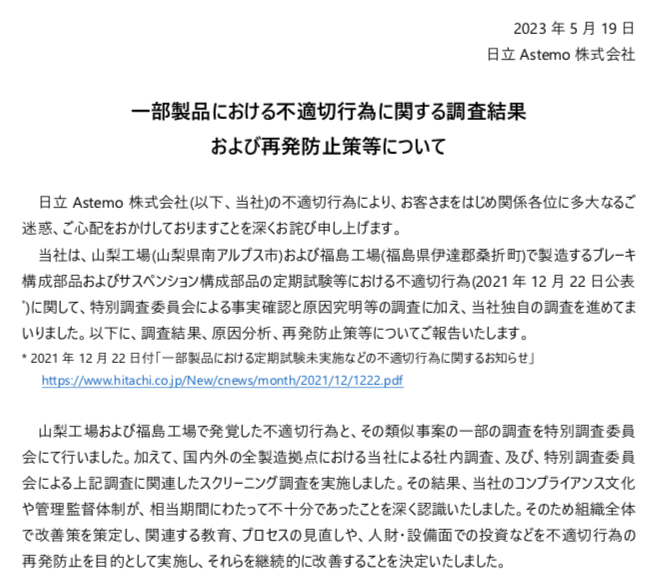
The investigation results show that there are 22 kinds of products produced by Hitachi Astemo, including automobile / motorcycle parts, railway vehicle parts and industrial parts. Quality inspection fraud exists in 15 domestic and foreign factories, including automobile brake and suspension systems, railway dampers, industrial dampers, etc., with more than 200m illegal products, some of which can be traced back to 40 years ago. In addition, in the investigation, in addition to the failure to carry out periodic tests and false reporting of test results, improper behaviors such as changing design specifications without customer approval were also found.
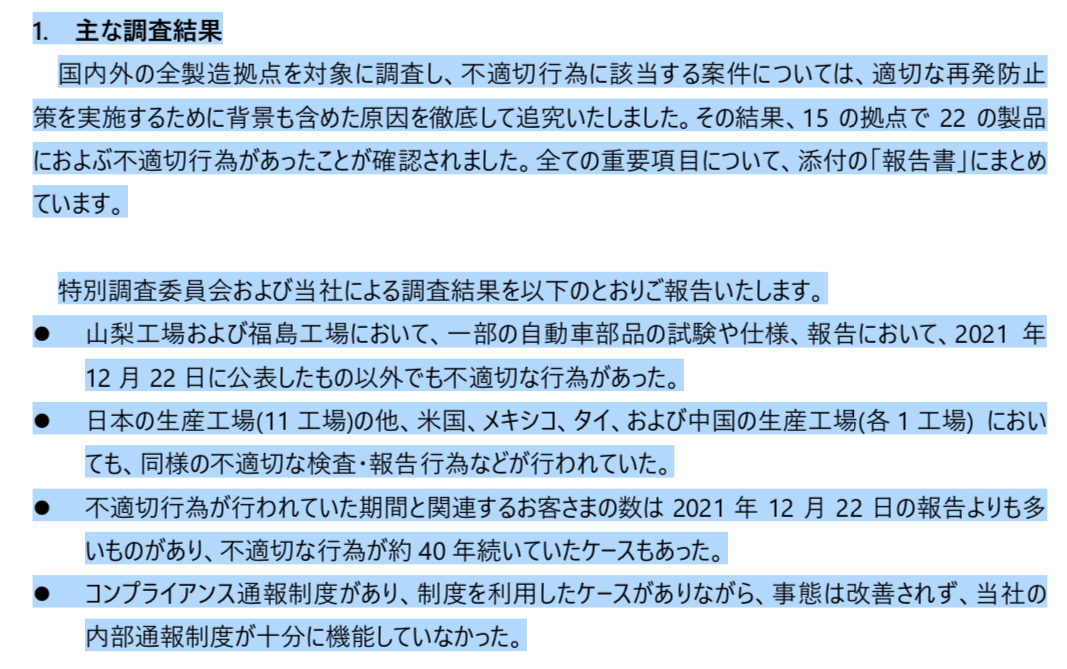
In fact, as early as December 22, 2021, Hitachi Anstemer publicly admitted that there were violations such as not checking or tampering with data in its factories. The illegal products involved 57000 brake parts produced by the Yamanashi factory and about 10 million suspension parts from the Fukushima factory. The violations lasted for about 20 years from 2000 to October 2021, and the illegal products affected 16 manufacturers, including cars and motorcycles. Following an apology from Toyota, Nissan, Honda, Suzuki, Mazda, Subaru and Daifa Industries, Hitachi Anstmer President CEO Coles said the violations were due to employees' inadequate awareness of the importance of inspections, inadequate monitoring systems, and the company's lack of manpower to carry out tests as required.
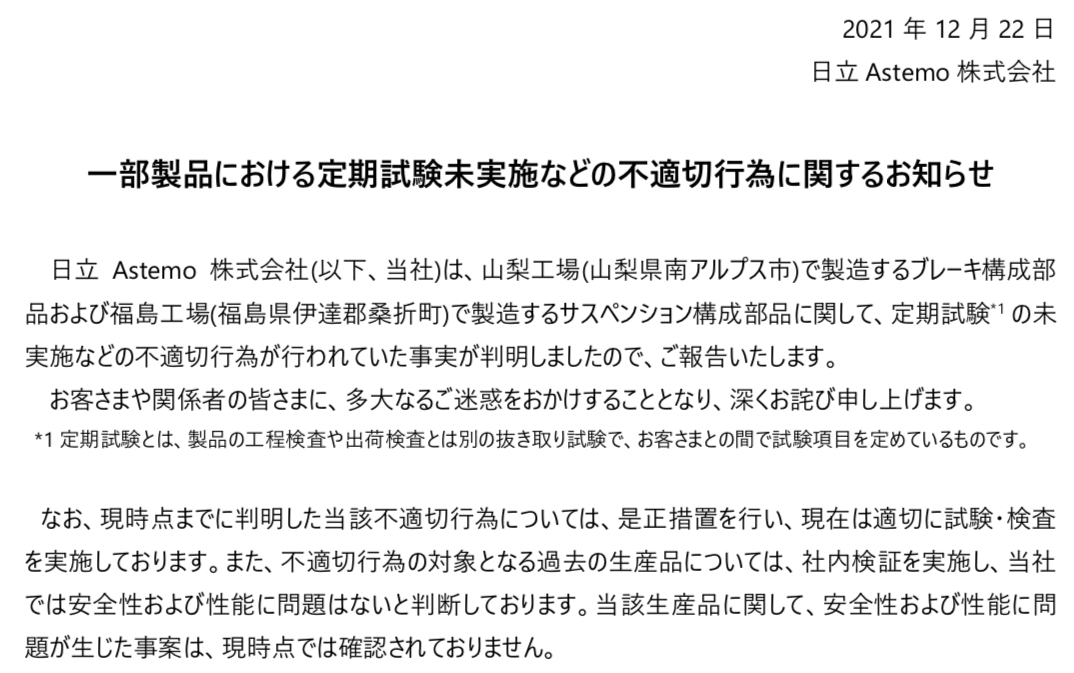
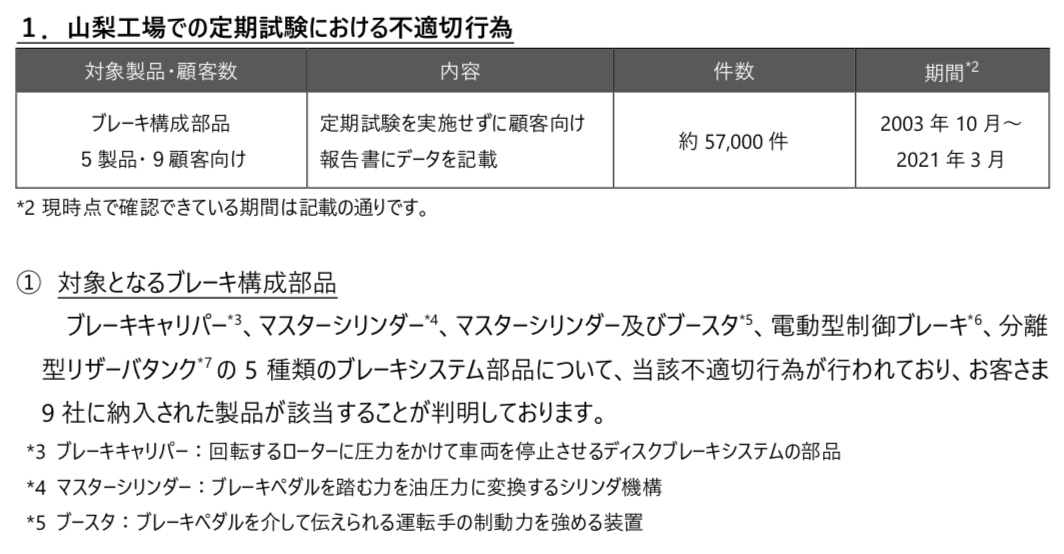

After that, Hitachi Anstemer conducted a survey of 140 factories around the world. according to the latest survey, the range of factories and customers affected this time is much larger than previously revealed. the number of related products related to automobiles, motorcycles, rolling stock and industry has also increased from more than 10 million previously announced to more than 200m. In addition, misconduct in some products has been going on for about 40 years, from January 1983 to April 2023. However, so far, Hitachi Anstemer has not recalled the products involved, saying that the standards it has set in its research and development and production process are very strict, leaving plenty of room, even if there is counterfeiting. there are no problems with safety and performance.
At a press conference on the same day, Brice Koch, President and CEO of Hitachi Anstamo, said: "We apologize for the great inconvenience and concern caused to our customers and other interested parties. We take the findings seriously, deeply regret the misconduct and poor regulation of this exposure, and will foster a strong compliance culture to prevent recurrence. "
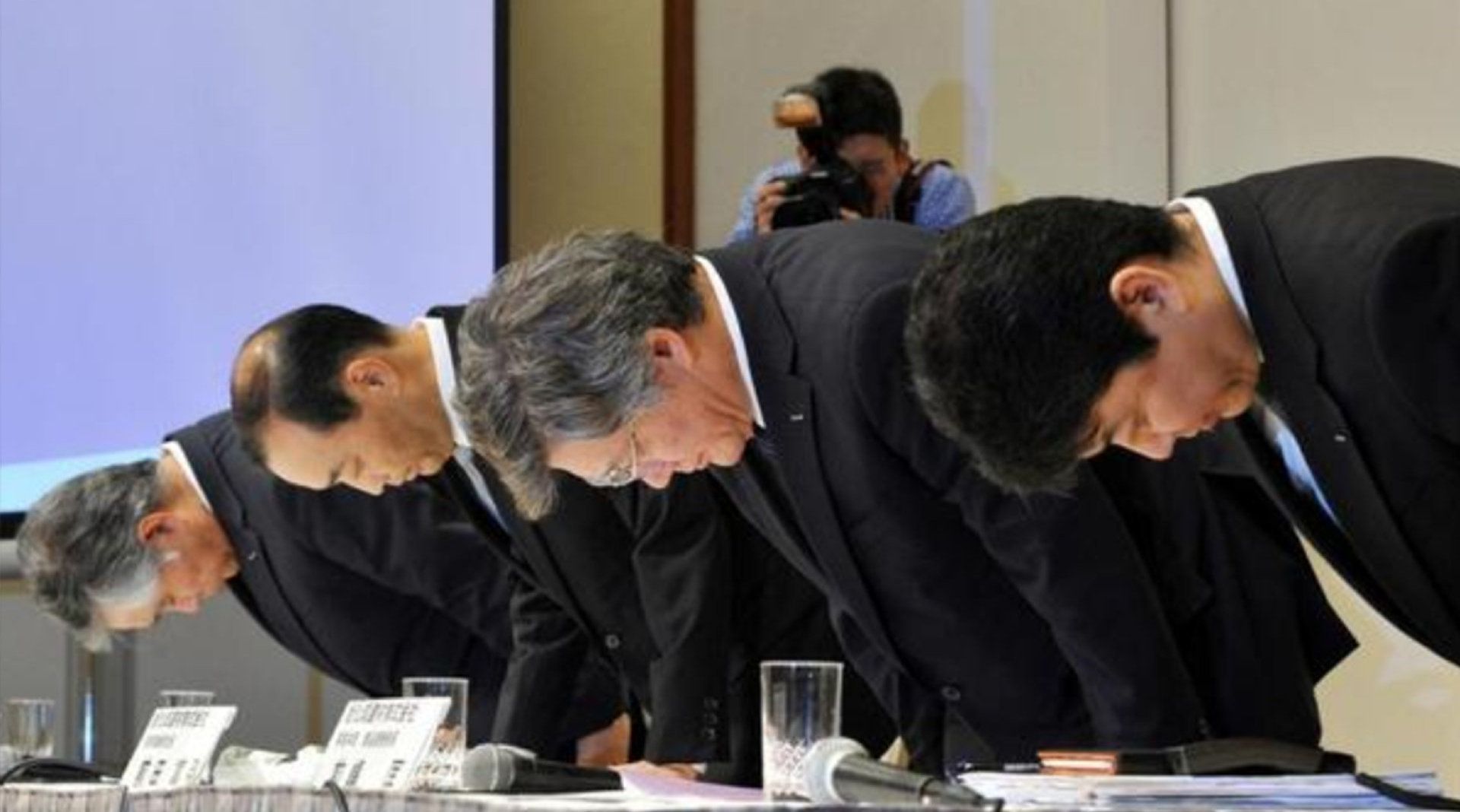
Hitachi Anstamo Co., Ltd. (Hitachi Astemo, Ltd) is mainly engaged in the development, manufacture and sales of automotive parts, transportation and industrial machinery and equipment and their systems. Hitachi Astemo is formed by the merger of four car retail manufacturers owned by Hitachi and Honda, with Hitachi holding 66.6 per cent and Honda Technology Research holding 33.4 per cent. On October 30, 2019, Hitachi Group and Honda announced the merger of Hitachi Automotive Systems and Honda's Keibin, Showa and Riksin Industries into a new company. the main products include electric vehicle transmission, electronic control components, chassis components, electrical systems, engine components, shock absorbers, brakes and steering systems, covering almost all major automotive parts. In march, Hitachi and Honda announced that they would change the shareholding of Hitachi Anstemor to 40 per cent each and introduce JIC Capital with a 20 per cent stake. As the third largest auto parts supplier in Japan, Hitachi Anstemo's business scale is second only to Denso and Aisa.
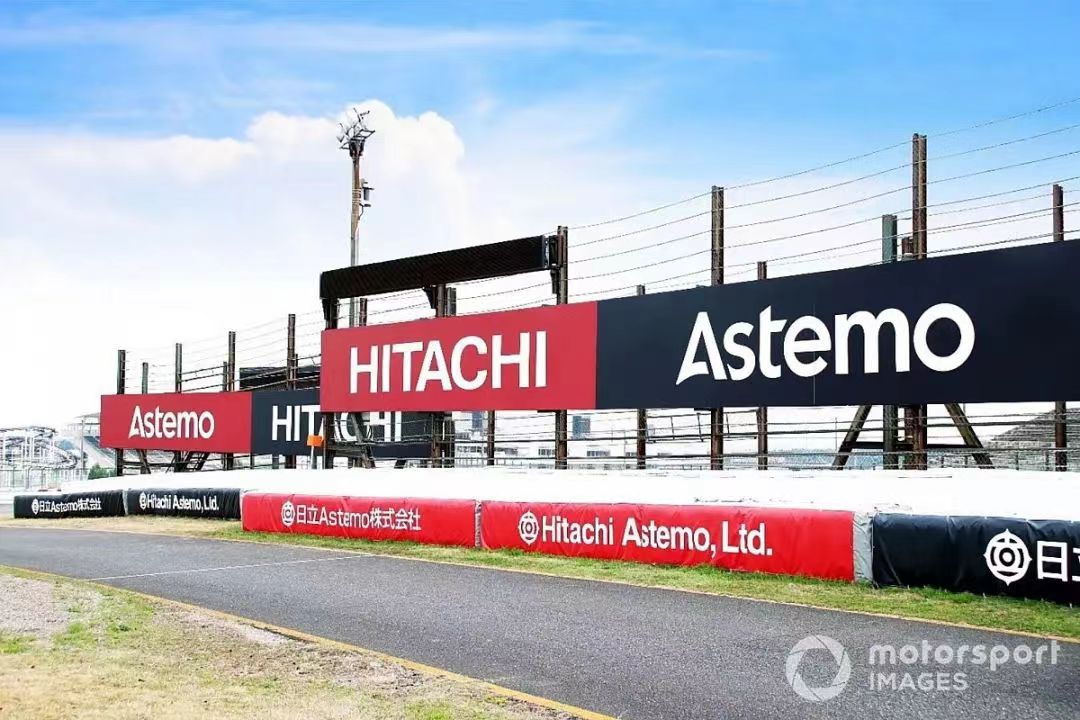
In recent years, Japanese auto parts companies and auto companies have experienced frequent "fraud" scandals, including the previously widely concerned "Takata airbag", "Shengang fraud" and "fuel pump defects" and so on. Auto Industry concern previously reported that in October 2017, steel producer Kobe Steel admitted to tampering with some copper and aluminum product inspection data to supply customers with shoddy quality; in July 2018, Nissan admitted that the company's five domestic plants had the problem of falsifying exhaust emissions and fuel consumption measurement data. In October 2020, Japan Junsheng Safety Systems Co., Ltd., the largest supplier of automobile seat belts in Japan, was accused of "data tampering" on some seat belts that did not meet the strength test standards. In February 2021, Japanese auto parts supplier dawning Brake Industry Co., Ltd., suppliers to Toyota, Honda, Mazda, Mitsubishi and other car companies, apologized to the public that about 114000 of the brake and parts products produced by the company's four local factories in Japan were tampered with or fabricated. Of these, about 5000 pieces did not meet the standard value agreed with the automaker. According to the time announced by Dawn, counterfeiting has been carried out for as long as 20 years, affecting 10 Japanese car companies, including Toyota and Nissan; on March 4, 2022, Hino Motor, a subsidiary of Japan's Toyota Motor Group, admitted to the outside world that engine data had been falsified for nearly 20 years.
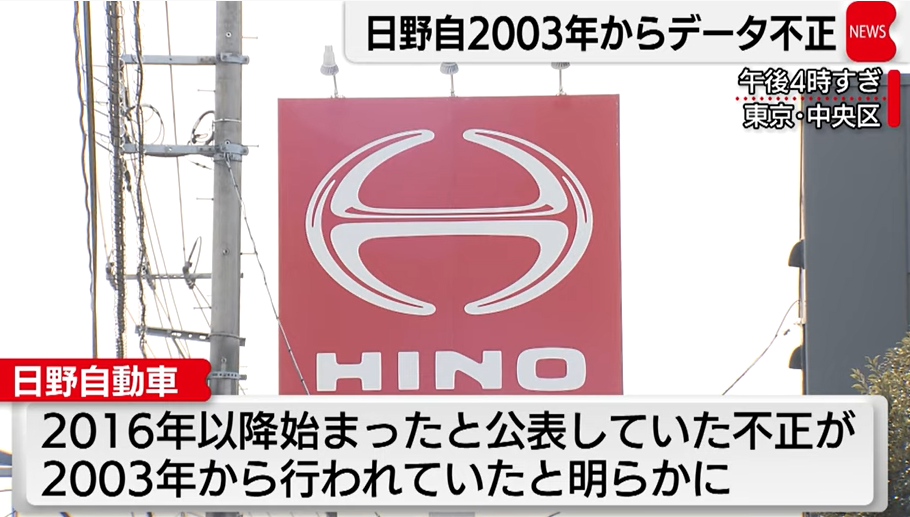
Recently, Toyota wholly-owned subsidiary Dafa Automobile Industry Co., Ltd. (hereinafter referred to as "Dafa Automobile") also disclosed two cases of quality inspection fraud one after another. At the end of last month, Dafa issued an announcement admitting that its four models (Toyota Yaris Ativ, Perodua Axia, Toyota Agya and an undisclosed product) had fraudulent behavior in side crash tests, which affected about 88000 small cars. Dafa Motor announced again on May 19 that it had found another violation in the crash safety test, including more than 78000 Dafa Rocky and Toyota Raize hybrid models sold in Japan, and finally decided to stop selling the two models.

"Automotive Industry concern" believes that Japanese enterprises, as a country with industry as the development, the production and manufacturing standards of "craftsman spirit" have been widely recognized internationally, but it has been exposed one after another that counterfeiting incidents not only affect the trust and interests between enterprises, but also pose a threat to the safety of consumers.
Welcome to subscribe to the WeChat public account "Automotive Industry Focus" to get the first-hand insider information on the automotive industry and talk about things in the automotive circle. Welcome to break the news! WeChat ID autoWechat
Views: 0
*The comments in the above article only represent the author's personal views and do not represent the views and positions of this website. If you have more insights, please feel free to contribute and share.











© 2024 AutoBeta.Net Tiger Media Company. All rights reserved.